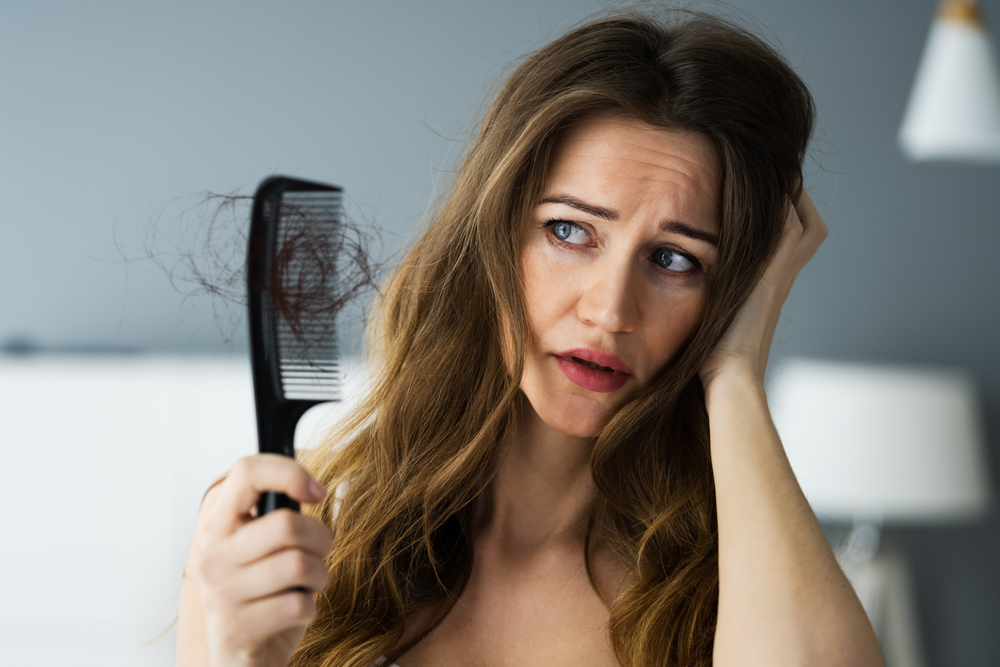Who Can and Cannot Take Minoxidil?

Content by

Last Updated
Start a Consultation Today
Minoxidil Spray For Hair Loss (Topical) From £21.24
Delivered discreetly from our UK Pharmacy.
Minoxidil is commonly used to treat hereditary hair loss. While it is effective and well-tolerated by most people, it is not suitable for everyone dealing with hair loss.
Before you head to your local pharmacy or take Minoxidil, it’s crucial to understand who can safely use it and who might need to explore other options. The effectiveness and safety of Minoxidil depend significantly on various factors, including the type of hair loss, age, existing health conditions and concurrent medications.
Continue reading as we explain what Minoxidil is, who can safely take it and who should avoid it. We also cover alternatives and FAQs about Minoxidil. Understanding whether this treatment is suitable for you is key to determining if it’s the right hair loss treatment for you.
Table of Contents
- What is Minoxidil
- Who Can Take Minoxidil?
- Who Cannot Take Minoxidil?
- Minoxidil Alternatives
- How Do I Know If Minoxidil Is Right For Me?
- FAQs About Minoxidil
- Does Minoxidil Actually Regrow Hair?
- Can Minoxidil Thicken Hair?
- Is Minoxidil Safe For Long-Term Use?
What is Minoxidil?
Minoxidil is a vasodilator, a class of medication that works by dilating or opening the blood vessels. It was originally developed to treat high blood pressure but it showed better efficacy in treating hereditary hair loss. It is sold under the brand name, Regaine, and comes in many forms including a topical liquid or foam, ranging in concentrations from 2% to 6%. Minoxidil also comes in 2.5mg oral tablets, which are only available with a prescription.
When applied directly to the scalp, Minoxidil increases blood flow, oxygen and nutrients to the hair follicles. Although It is not clear how Minoxidil promotes hair growth, experts say it shortens the telogen (resting) phase of the hair growth cycle and stimulates hair follicles into the anagen (growing) phase. [1]
Who Can Take Minoxidil?
Adults With Androgenetic Alopecia
Minoxidil is used by men and women to treat a hereditary hair loss condition called androgenetic alopecia (male or female pattern hair loss). In fact, Minoxidil is one of the FCA-approved active ingredients clinically proven to reverse androgenetic alopecia. [2] A topical 5% solution, 5% foam, or a slightly higher-strength topical 6% solution is recommended for men whilst a topical 2% solution is recommended for women.
Adults With Other Hair Loss Conditions
Minoxidil was originally developed for pattern hair loss and hair thinning. However, it may benefit people with other hair loss conditions such as age-related hair loss, telogen effluvium (stress-related hair loss) and alopecia areata.
Who Cannot Take Minoxidil?
People with Complete Baldness
Minoxidil is most effective for those in the early stages of hair loss. The treatment works by prolonging the growth phase of hair follicles. However, it is not effective in cases of complete baldness where the hair follicles are shaved or no longer active. As the hair follicles are usually no longer viable, Minoxidil would have little to no effect.
People with Scalp Conditions
For people with an existing scalp condition such as psoriasis and eczema Minoxidil is not recommended as it could potentially worsen symptoms. The ingredient found in Minoxidil-based products may irritate sensitive or inflamed skin, leading to further discomfort and potentially worsening of the underlying scalp condition. In addition, people with a sunburnt scalp and those with any kind of dressing on their scalp should avoid using Minoxidil until the area has fully healed.
People Over 65
The efficacy and safety of Minoxidil in people over the age of 65 is not well-studied yet. Minoxidil is generally documented in people over 18 and under 65. As the skin's characteristics and responses can alter with age, older adults over 65 may experience different results or an increased risk of side effects.
People with Health Conditions
Despite its topical application, a small amount of Minoxidil can be absorbed by the body, potentially affecting blood pressure and overall cardiovascular function. Those with pre-existing health conditions, such as heart, liver or kidney disease, or those taking high blood pressure medication, should avoid using Minoxidil. Minoxidil was originally developed as a blood pressure medication and may still exert effects on cardiovascular health when used as a hair loss treatment.
Pregnant and Breastfeeding Women
Women who are pregnant or breastfeeding should avoid using Minoxidil. The possible absorption of Minoxidil could potentially harm unborn babies, affect fetal development or pass into breast milk.
Children
Similar to people over 65, there is not enough research on the effectiveness and safety of Minoxidil in children and adolescents under 18. Hormonal and biological differences mean the causes and progression of hair loss in children can differ significantly from adults. In paediatric cases, hair loss can be a symptom of an underlying health condition, making it crucial to treat the root cause rather than promote hair regrowth.
People Who Are Allergic
Anyone allergic to Minoxidil or other ingredients found in Minoxidil-based products such as propylene glycol or ethanol should avoid it. Before applying Minoxidil to the scalp, users should patch-test the product by applying it to a small area on the skin and waiting for at least 48 hours. If symptoms such as a rash, irritation, itchiness, swelling, dizziness or trouble breathing occur, seek medical attention immediately.
Minoxidil Alternatives
If you can not take Minoxidil for any given reason or wish to explore your options, there are other alternative medications for male pattern baldness available at Chemist Click:
Finasteride
Finasteride is an oral prescription medication for male pattern baldness. It works by blocking an enzyme in the body that converts testosterone into dihydrotestosterone (DHT). By reducing DHT levels, Finasteride can reverse male pattern baldness and promote hair growth. One Finasteride 1mg tablet must be taken daily. Bear in mind that Finasteride is not intended to treat female pattern hair loss and other hair loss conditions.
Regaine
Regaine is a brand name for a Minoxidil-based product. At Chemist Click, Regaine is available as an Extra Strength 5% Foam for men. It is suitable for men aged between 18 and 49. This topical 5% foam works by increasing blood flow around the hair follicles, encouraging hair growth and extending the growing phase of each hair follicle. It is applied to the scalp area twice daily and results can be noticed as early as 8 weeks.
Non-Medical Alternatives to Minoxidil
For many experiencing hair loss, medical treatments such as Minoxidil are not always the first or the most suitable option. Whether due to medical conditions, personal preferences, or simply looking for alternative therapies, exploring non-medical approaches can bring some positive results dependent on the cause and degree of hair loss experienced. Here are several natural ways to prevent hair loss or hair thinning in your daily regime:
1. Make Dietary Adjustments
What you eat can have a significant impact on the health of your hair. Protein-rich foods, such as eggs, fish, and nuts, can promote hair strength and growth. Additionally, foods high in vitamins A, C, D, and E, zinc, iron and omega-3 are crucial for hair follicle health. Improving your diet can be one of the most natural and effective ways to combat hair loss.
2. Reduce Stress
Stress is a common culprit behind hair loss. Trying out different stress management techniques such as yoga, meditation or taking part in regular physical activity can help to mitigate stress-induced hair loss.
4. Consider Your Hair Care Products
Switching to gentle, natural hair care products can help reduce hair loss. Many shampoos and conditioners contain harsh chemicals that can weaken your hair with regular use. Look for products with natural ingredients that nourish the scalp and hair.
5. Avoid Harsh Treatments
Minimising the use of harsh chemical processes like perms, bleach, and dyes, as well as limiting heat styling, can also help to protect your hair from further damage and loss. Opting for looser hairstyles will also minimise tension on the scalp and strain on hair follicles.
Exploring these non-medical approaches can be a practical first step to tackling hair loss. It’s important to note however that results will vary depending on the root cause of your hair loss. If your hair loss continues or you have growing concerns, speak to your doctor or GP.
How Do I Know If Minoxidil Is Right For Me?
If you feel unsure about using Minoxidil, refer to the patient information leaflet. Your doctor or GP can help you to determine if Minoxidil is the right product for you. Through a regular examination and blood test, your doctor or GP will look at your personal circumstances and overall health to decide the best treatment for your hair loss condition, whether that is Minoxidil or an alternative.
Minoxidil is available over the counter or online at your local pharmacy. Chemist Click offers a free online consultation before you can purchase it. Filling out our questionnaire allows our qualified pharmacists to ensure Minoxidil is safe for you to use. We also offer fast and discreet delivery across the UK mainland.
FAQs About Minoxidil
Does Minoxidil Actually Regrow Hair?
It is scientifically proven that Minoxidil can help regrow hair and reverse hair loss caused by androgenetic alopecia. Read our article “Does Minoxidil (Regaine/Rogaine) Actually Work?” to learn more about how it works. The effectiveness of the treatment can vary from person to person. Please note that once a person stops using Minoxidil, hair loss can return.
Can Minoxidil Thicken Hair?
Aside from hair growth, studies have shown that Minoxidil can thicken hair. In 2009, a study was carried out amongst 300 Japanese men over 20 years with androgenetic alopecia. 150 participants were given 5% topical Minoxidil and the other 150 participants were given 1% topical Minoxidil for 24 weeks. The study found that the group using 5% topical Minoxidil showed a better increase in hair density compared with those using 1%. [3]
Is Minoxidil Safe For Long-Term Use?
Minoxidil is relatively safe to use long-term once the recommended dosage is not exceeded. It is normal for users to experience temporary excessive shedding during the first few weeks of using Minoxidil. Exceeding the dosage can increase the risk of side effects such as scalp irritation, itchiness and burning.
Sources
- WebMD. (n.d.). Minoxidil Solution, Non- - Uses, Side Effects, and More. Retrieved 30th October 2024, from: https://www.webmd.com/drugs/2/drug-3503/minoxidil-topical/details
- Devjani S, Ezemma O, Kelley KJ, Stratton E, Senna M. (2023). Androgenetic Alopecia: Therapy Update. Retrieved 30th October 2024, from: https://pmc.ncbi.nlm.nih.gov/articles/PMC10173235/
- Tsuboi R, Arano O, Nishikawa T, Yamada H, Katsuoka K. Randomized Clinical Trial Comparing 5% and 1% Topical Minoxidil for the Treatment of Androgenetic Alopecia in Japanese Men. Retrieved 30th October 2024, from: https://pubmed.ncbi.nlm.nih.gov/19691748/
Whilst all of our content is written and reviewed by healthcare professionals, it is not intended to be substituted for or used as medical advice. If you have any questions or concerns about your health, please speak to your doctor.
